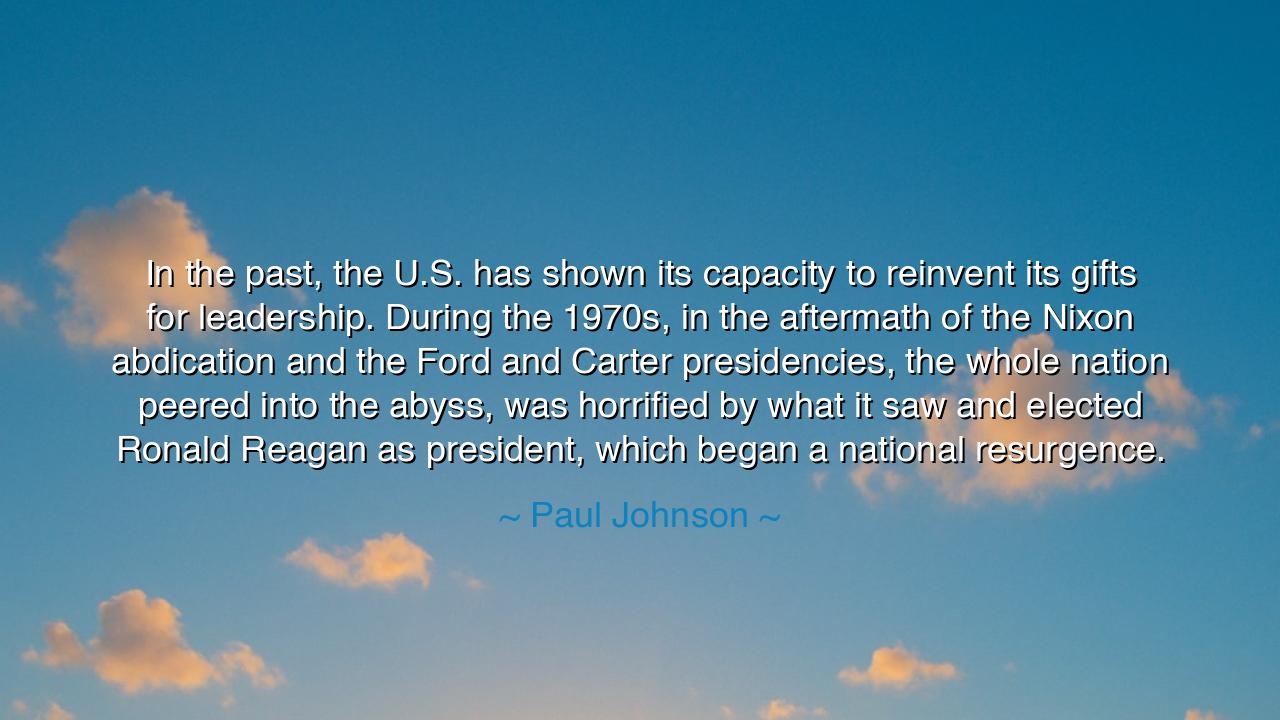
In the past, the U.S. has shown its capacity to reinvent its
In the past, the U.S. has shown its capacity to reinvent its gifts for leadership. During the 1970s, in the aftermath of the Nixon abdication and the Ford and Carter presidencies, the whole nation peered into the abyss, was horrified by what it saw and elected Ronald Reagan as president, which began a national resurgence.






“In the past, the U.S. has shown its capacity to reinvent its gifts for leadership. During the 1970s, in the aftermath of the Nixon abdication and the Ford and Carter presidencies, the whole nation peered into the abyss, was horrified by what it saw and elected Ronald Reagan as president, which began a national resurgence.” — Paul Johnson
These words, spoken by the historian Paul Johnson, are not merely an observation of politics — they are a reflection on the enduring resilience of a people. In his quote, Johnson captures a truth that transcends nations and ages: that leadership, though it may falter, can be reborn; that a society, though it may stumble into darkness, can still find its way back to light. He speaks of America’s capacity for renewal, of its uncanny ability to rediscover its purpose and strength in times of despair. His words recall an ancient rhythm of rise, fall, and rebirth — the eternal cycle of human civilization.
The origin of this quote lies in Johnson’s reflections on modern history and his fascination with America’s role in the 20th century. A British historian and philosopher, he admired the United States not merely for its wealth or power, but for what he called its “moral dynamism” — its ability to correct itself when it loses its way. The 1970s had been a time of crisis: the Vietnam War had left deep scars, Watergate had shattered trust in government, and the economy languished in stagflation. America seemed exhausted, uncertain of its purpose, disillusioned with its leaders. Johnson describes this moment as the nation “peering into the abyss” — a poetic way of saying it faced itself honestly, and was horrified by the weakness, cynicism, and confusion reflected back. Yet from that very reckoning, he writes, came a resurgence, a rekindling of spirit embodied in the election of Ronald Reagan.
To understand Johnson’s insight, one must look beyond politics and into the soul of the people. What he saw in the American story was something universal — the human gift of reinvention. Great nations, like great individuals, are not defined by their failures, but by their responses to them. The collapse of trust during Watergate was not the end of democracy, but a test of its endurance. The humiliation of Vietnam was not a final defeat, but a painful reminder of humility and renewal. In the ancient world, too, such cycles repeated: Rome, after civil war and corruption, found stability under Augustus; Athens, humbled by defeat, gave the world philosophy and art. In every age, the same truth unfolds — the abyss can destroy, or it can awaken.
When Johnson speaks of Reagan’s election as the beginning of a “national resurgence,” he does not worship the man, but honors the moment. Reagan’s rise marked a restoration of confidence, a belief that America could still lead, still create, still inspire. Whether one agreed with his policies or not, it cannot be denied that he spoke to the spirit of renewal — a spirit that believed the nation’s best days were not behind it. The power of such leadership, as Johnson suggests, is not in policies alone, but in vision — in the ability to remind a weary people of who they are. True leadership calls forth what already exists within the people: courage, optimism, and faith in the future.
In this way, Johnson’s words transcend the story of one president or one country. He is describing a principle of civilization itself — that when a people confronts its own failure with honesty, it discovers the seeds of its salvation. The abyss becomes the teacher, the darkness the forge in which strength is remade. From despair, wisdom is born; from humility, unity. When nations lose their way, they must first look inward, as America did in the 1970s, and ask: what have we become? And only after that confession can they rise again to ask: what shall we be?
History is filled with such resurgences. After the ruin of the Second World War, Europe rebuilt itself through cooperation and vision. After the Great Depression, the United States found courage in the New Deal, rediscovering compassion and innovation. After the fall of the Roman Republic came the Pax Romana, and after every night of chaos, humanity has found dawn. Johnson’s quote, then, is a hymn to that eternal dawn — a belief that civilization, like the human heart, is capable of moral rebirth.
Let this be the lesson passed down: that the measure of a people is not in their perfection, but in their capacity for renewal. When corruption, division, or fear cloud the path, let nations — and individuals — not despair, but look inward and rise. The abyss is not the end; it is the mirror that reveals the need for change. Leadership, in its truest form, is not domination but restoration — the art of calling forth light from shadow, order from chaos, faith from disillusion.
So, O listener, remember the wisdom of Paul Johnson: that even when the world seems lost, resurgence is always possible. For within every age of failure lies the seed of greatness, waiting for courage to awaken it. The abyss may terrify us — but if we face it with open eyes, it becomes not our grave, but our gateway. And through that gateway walks every people who have learned, at last, the sacred power of reinvention.






AAdministratorAdministrator
Welcome, honored guests. Please leave a comment, we will respond soon